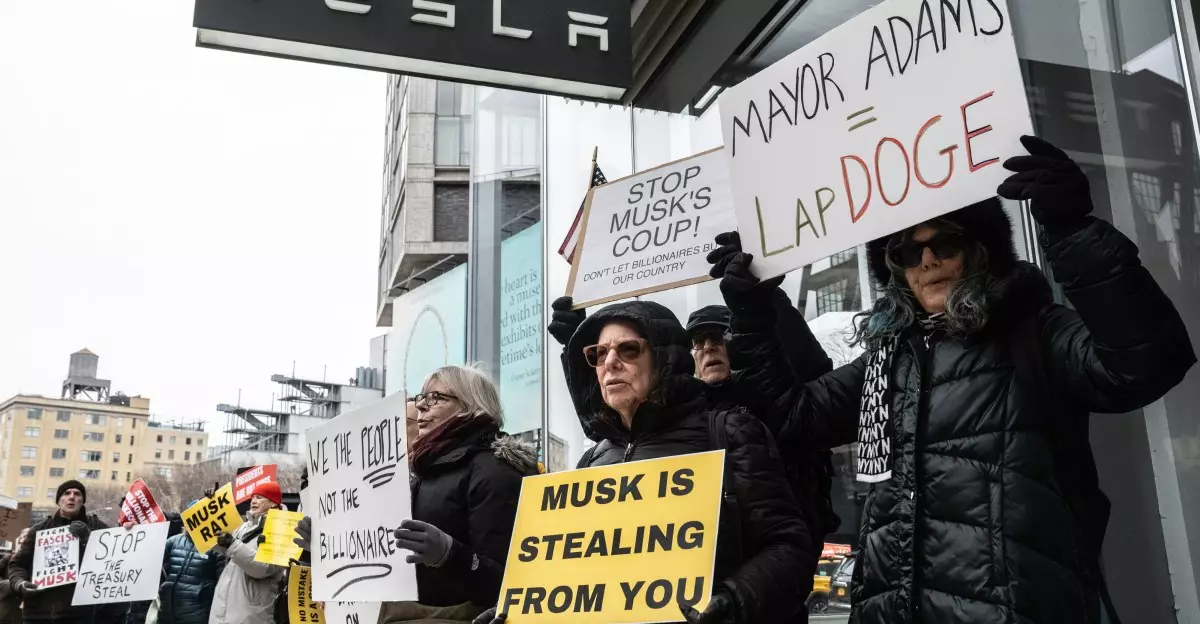In an era marked by increasing political engagement and the influence of corporate leadership, the recent series of protests against Tesla stands out as a significant phenomenon. As demonstrators gathered outside Tesla showrooms across the United States, their calls for change echoed a broader discontent with CEO Elon Musk’s leadership and political affiliations. This unrest has garnered attention not only for its sheer scale but also for the complex motivations that underlie it. From major cities like New York to smaller locales such as Golden Valley, Minnesota, these protests have ignited discussions about corporate responsibility and the consequences of personal politics on a company’s public image.
At the heart of the protests lay a critical examination of Musk’s dual role as a business leader and a prominent political figure. His contributions to the Department of Government Efficiency during Donald Trump’s presidency have been scrutinized, suggesting that critics perceive a troubling alignment between Tesla’s corporate ethos and Musk’s political activities. The recent stock price plunge—down 21 percent since Trump’s inauguration—has heightened anxieties among investors who fear that Musk’s political involvement could jeopardize the company’s financial stability. This reality has triggered discussions within Tesla, where some employees reportedly voiced a belief that the company might benefit from Musk’s resignation in a recent meeting.
The protests, though varied in size and location, have been unified by a common theme: disillusionment with a billionaire who many believe has overstepped boundaries. Among the slogans chanted were “Don’t buy swasticars” and “Elon Musk can go to Mars; we don’t need your Nazi cars,” reflecting the concerns over Musk’s perceived associations with far-right groups. The activism seen today is fueled by technological platforms like Twitter, where hashtags such as #TeslaTakeover instantaneously mobilize support and create a sense of urgency.
While the key gatherings were in trend-centric cities such as New York and San Francisco, the movement has branches reaching into less recognized locations. The protest spectrum showcases a mosaic of political sentiment, with events scheduled in states as diverse as Ohio, Florida, and even as far as Alberta, Canada. These planned demonstrations illustrate that the dissent against Tesla resonates beyond U.S. borders, suggesting a global concern about corporate governance.
Notable public figures have added fuel to the fire, amplifying the movement’s messages. Actor and activist Alex Winter, who has openly supported the protests, emphasized his call for consumers to reevaluate their relationships with Tesla. His actions underscore a growing awareness of corporate accountability not just among activists, but within popular culture at large. The involvement of musicians and other creative professionals, who utilize their platforms to convey political messages, has become a crucial aspect of this collective outcry.
Parallel to traditional protests, alternative forms of dissent have emerged. Renowned musician Sheryl Crow’s recent social media statements, specifically her video depicting a Tesla being towed away, crystallize the notion that consumer choices can signal political affirmations or rejections. Her decision to donate to NPR—an organization currently mired in controversy—highlights the complexities of supporting media in the face of political strife.
As protests continue to mount, with additional rallies scheduled around President’s Day, the conversation surrounding Tesla extends beyond just a single corporation. It becomes necessary to consider the potential implications for corporate America at large. Consumer activism enriched by social media indicates that public opinion can now reshape corporate strategies in unprecedented ways.
With divisive leadership now influencing public sentiment, many companies may find themselves at a pivotal crossroads. They must address the growing demands from consumers and employees alike for ethical governance that reflects collective values rather than individual agendas.
The protests against Tesla represent a broader societal shift toward demanding accountability from both corporate leaders and themselves as consumers. The growing agitation aimed at Musk signifies a yearning for more principled leadership. As this movement evolves, it becomes more than just an expression of discontent; it transforms into a clarion call for a future where corporate ethics align more closely with the values of the communities they serve. In this way, the dissent against Tesla lays the groundwork for societal change that transcends the boundaries of the automotive industry.

